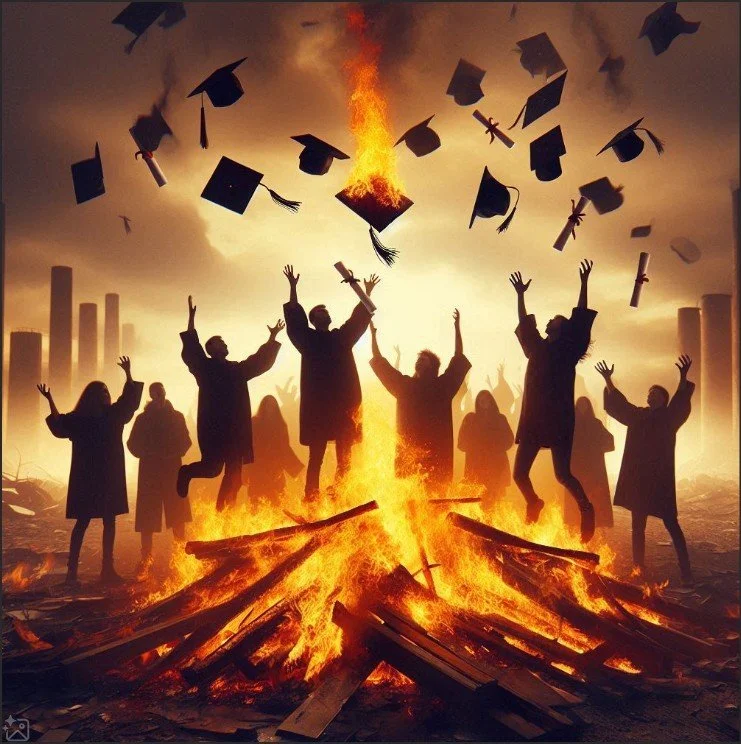Bonfire of the Sheepskins
by James A. Bacon
As tuitions climb ever higher and the wage premium for a college degree has plateaued, an increasing percentage of Americans — especially younger Americans — consider their diplomas a waste of money, concludes Indeed, an online job site, on the basis of a new survey.
Twenty percent of Baby Boomers considered their college degrees worthless, but the percentage increased to 41% for Millennials and 51% for Gen Z, found the poll, which queried 772 U.S. adults who are employed or seeking employment and have an associate degree or higher.
The high cost of higher-ed means that half of all respondents (52%) were saddled with student debt. Unsurprisingly, those with higher debt burdens were more likely to question the value of their degrees.
“The combination of stagnating wage benefits, skyrocketing costs, degree saturation and debt may explain why younger generations increasingly question whether college is worth it,” states Indeed’s analysis. “The traditional promise of higher education simply doesn’t align with the reality many younger professionals experience.”
These findings should strike terror into the hearts of university administrators, who are already stressed about the plateau in the number of traditional college-age students and falling enrollment rates. The declines have been most pronounced in community colleges but has afflicted many four-year institutions as well.
Elite public universities in Virginia such as the University of Virginia, Virginia Tech, and the College of William & Mary are less likely to be affected by these trends, as applicants will, all other things being equal, choose to attend more prestigious institutions over those lower in the status hierarchy, especially when tuition is subsidized by the state. But smaller, liberal arts colleges that emphasize a general education in the humanities as opposed to marketable, profession-specific skills, of which there are many in Virginia, could be in a world of hurt.
One challenge is market saturation and the decline of the college wage premium. For many years, colleges and universities touted the value of a college degree based on the fact that on average, college grads earned significantly more money over their lifetimes than non-grads. So many people have degrees now, however, that the supply-demand equation has shifted.
“When college degrees are more common, there may not be enough highly skilled jobs to go around; some college-educated workers lose out to others and are pushed into less-skilled jobs,” Indeed quotes sociologist Jonathan Horowitz as saying.
Add to that the fact that many respondents believe that they are over-qualified for their jobs — the Starbucks barista phenomenon. Sixty-eight percent of Gen Z respondents confirmed that they believe they could do their job without a degree versus 49% of Baby Boomers, says Indeed.
Then factor in changing employer attitudes. Where employers might have previously seen college graduates as having unique, irreplaceable skills, says Indeed, they now see more overlap between what college and high school graduates can contribute. Says Indeed: “Younger professionals are entering a job market where the distinction between having a degree and not having one has blurred for many positions.”
Another 30% of respondents said they feel that artificial intelligence has made their degree irrelevant.
I would jump in here to observe that much of what students learn in college is of questionable value, especially when they aren’t held to high standards of creativity, expression, and analytical rigor. When the student-wide grade-point average for UVA, a so-called Public Ivy, is 3.7 and rising, and when AI-generated cheating is out of control, it’s debatable how much students are actually learning… other than how to manipulate AI.
Another potential trend causing of the crashing-and-burning value proposition is the rise of intellectual monocultures that stultify the range of ideas that students can explore, suppress free expression, and train students to regurgitate that professors want to hear rather than engage in critical thinking.
Like the man who set himself on fire at a New York courthouse last year, the higher-ed sector is immolating itself. I have no confidence that many institutions are salvageable. In fact, many people are cheering the Trump administration’s bullying of the Ivy Leagues. A large swath of American society takes a very different view of them than they take of themselves: as condescending, unaccountable and parasitical. Many are happy to see them get their comeuppance.
I’ve been predicting this backlash for many years. The revolt is taking a coercive, top-down form I would not have wished for, but I’m not surprised in the least. My main consolation is that the new economic order will be based less on college credentials, which mean less and less, and more on what people can actually do.

